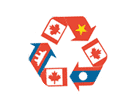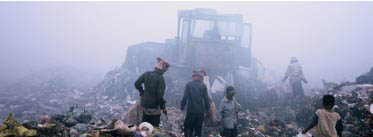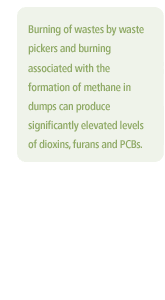



WASTE-ECON PROJECT Lao
PDR VOLUME 1, ISSUE 1 - September 25, 2003
Making Waste Work for the Economy
Garbage is something most people don’t think about much after they throw it away. However, it might surprise some people to know that recycling and reuse are very much part of the Laotian economy, where materials with monetary value are taken from the waste stream and sold to eager buyers. A visit to a local recycle bank in Vientiane Municipality would reveal a host of uncommonly thought of treasures, every thing from used plastic water bottles and bags to cardboard packaging from motorbike sales. Despite this Despite this active recycling process, 60 percent of the 200 tons of waste created in Vientiane Municipality each day still ends up at the city’s landfill. The aim of the Waste-Econ Program is to retain the most beneficial aspects of this traditional waste economy while at the same time creating new opportunities to enhance the economic situation of the people involved in this sector. In this premiere issue of Waste-Econ in Lao PDR we will highlight past and future activities of the project and how we are working to achieve our goal of improving the economy and the environment through better waste management.
Waste-Econ Core Training Course
The first major activity of Waste-Econ Laos was the six-week training course held June 24th - August 2nd, 2002 in Vientiane. Forty-five participants from a variety of sectors were invited to take part in the training course. Professors from the University of Toronto in Toronto in Canada and a professor from Vietnam trained participants on urban solid waste management and technologies; industrial waste management; research methods; economics of waste management; public health; and, the informal sectors’ role in the waste economy. Those in attendance had the opportunity to explore waste management issues first hand through a tour of Vientiane's landfill at Kilometre 18 as well as a number of factories throughout the city. Participants completed their own fieldwork and reported on a variety of waste management topics.
Provincial Training Course
The two-week provincial training course, held this past June in Champasack Province, were organized by the National Science Council in Vientiane and the Science, Technology and Environment Office in Champasack Province. The purpose of the two-week training course course was to disseminate the knowledge gained in the core training course held in Vientiane to other provinces in Lao PDR. Those who took part in the two-week training course came from across the country to attend the training. Some of the assistant lecturers and graduates from the core
training course last year taught the material to the participants in Champasack. Thirty people have now been trained on integrated waste management topics as a result of this course.
Creating Value From Market Waste
At anytime of the day or night one can find just about anything in markets scattered throughout the city of Vientiane. Four of the city’s main markets, Thongkhankham, Khuadin, That Luang and Sikhai are home to a wide array of products, everything from fresh fruits and vegetables to clothing and CDs. However, this quantity and product variation causes problems in terms of how to effectively collect and dispose of the generated waste. Currently, waste from market vendors is collected and taken to the landfill. While some products, such as plastic water bottles and cardboard, are separated out by market vendors and informal waste collectors, there is still a significant amount of waste that must be transported to the landfill each day. A large proportion of this waste stream is organic and could be used more effectively to create an economically valuable and environmentally beneficial product called compost. While the concept of using organic waste for compost is not new, the idea of increasing the value of a currently undervalued waste product is. It is this idea that is at the core of Waste-Econ’s pilot project in Laos. The pilot project, which began at the end of June 2003, focuses not only on creating compost from market waste, but also on creating a system for doing so that will be economically self-sufficient and sustainable. In order to achieve this goal a number of studies are currently underway to determine the feasibility of such an undertaking. Graduate engineering and urban planning students from the University of Toronto and Queen’s University are working with Nabong Agricultural University and the National Science Council to determine the quantity and composition of market waste, site and transportation costs related to a new compost facility, willingness of market vendors to participate in source separation and potential markets for the final product. The results of these studies will be available in the coming months.
Planning Conferences
Each year a national and international planning conference is held to create strategic plans for the upcoming year’s activities and to share experiences and ideas between Waste-Econ’s partner countries. This year the National Science Council in Lao PDR hosted the first international conference for the partner countries of Vietnam and Cambodia and Canada. Attendees appreciated the communication between the partner countries as well as the hospitality of the Laotian partners.
